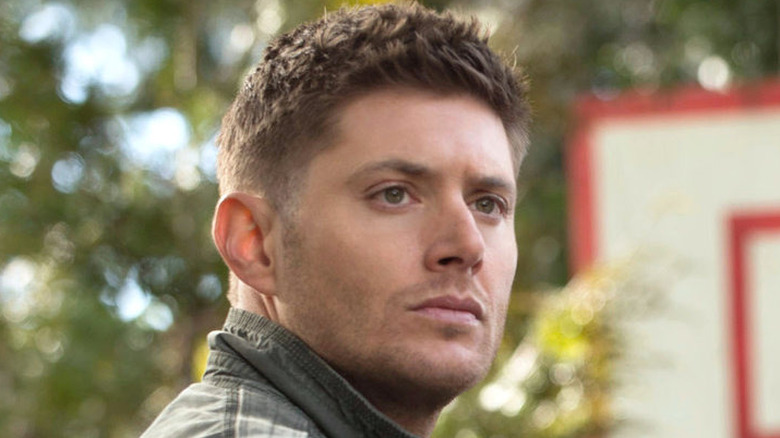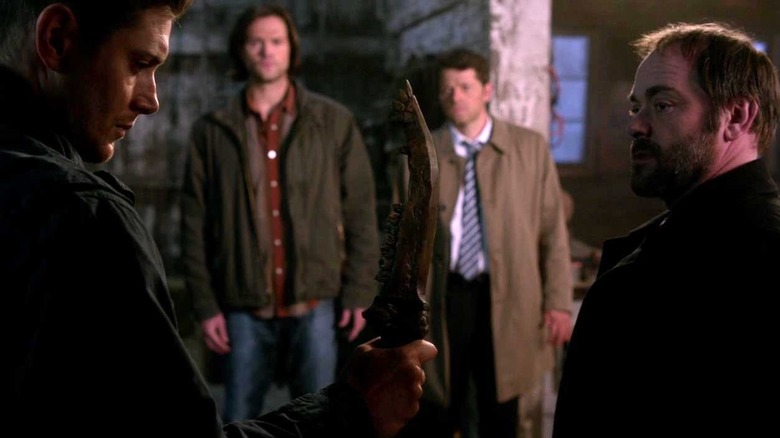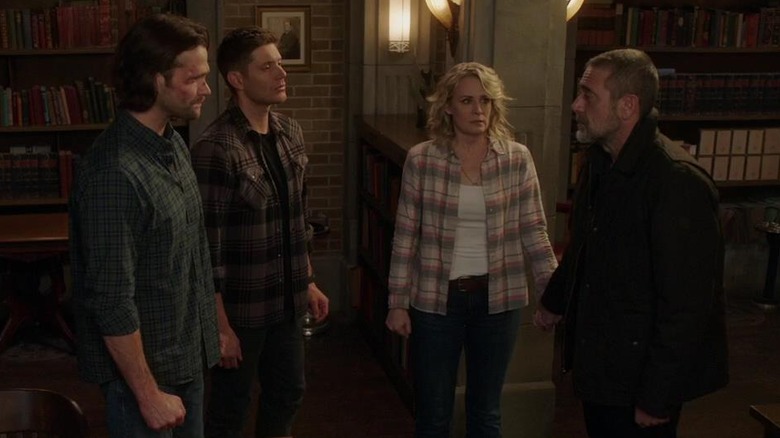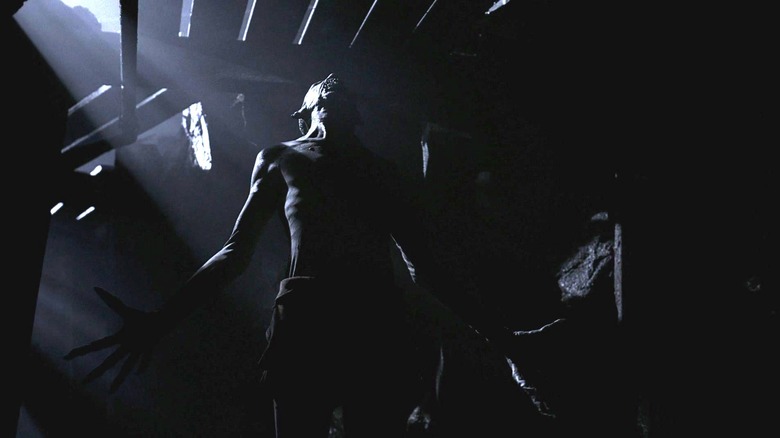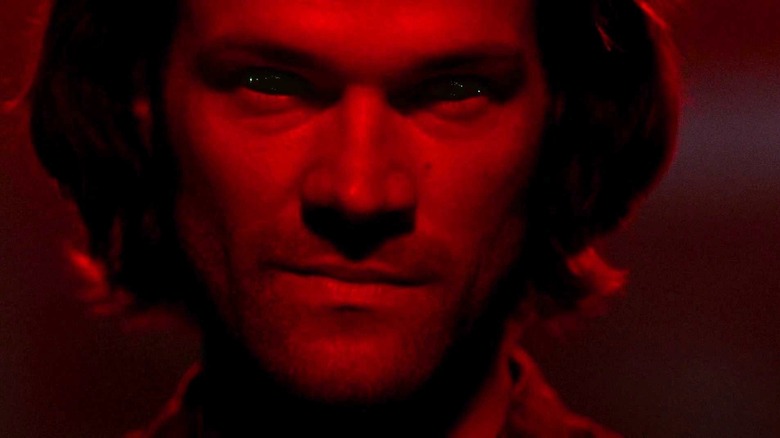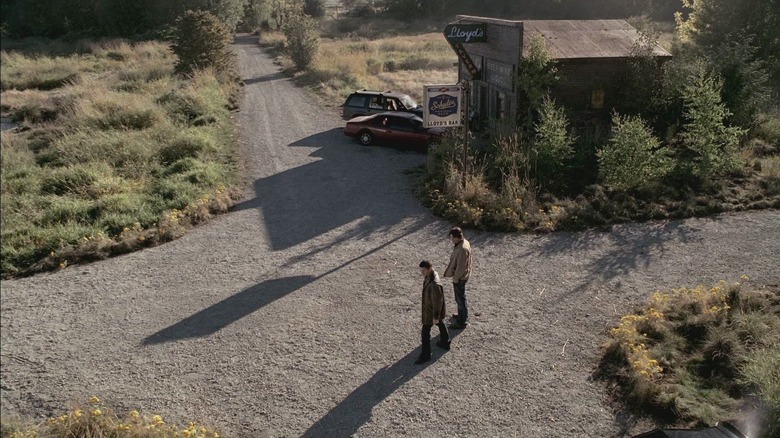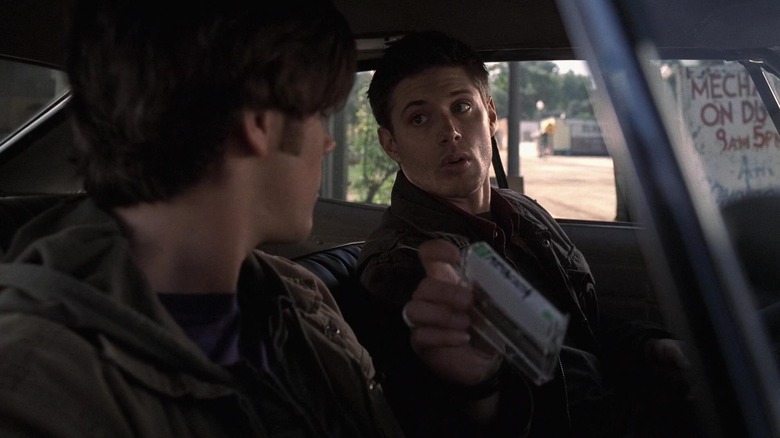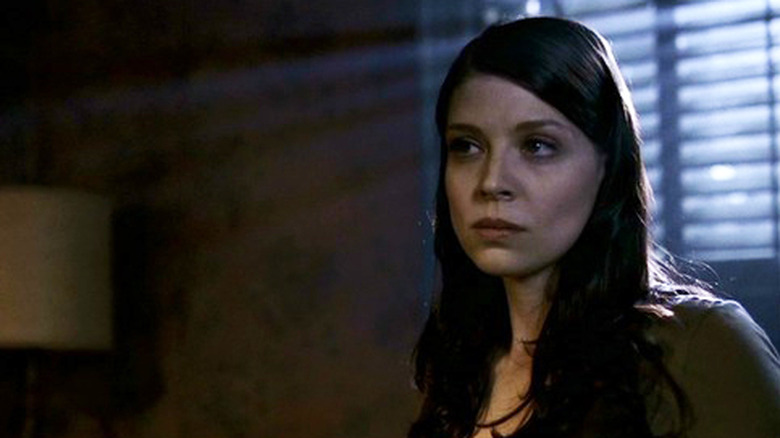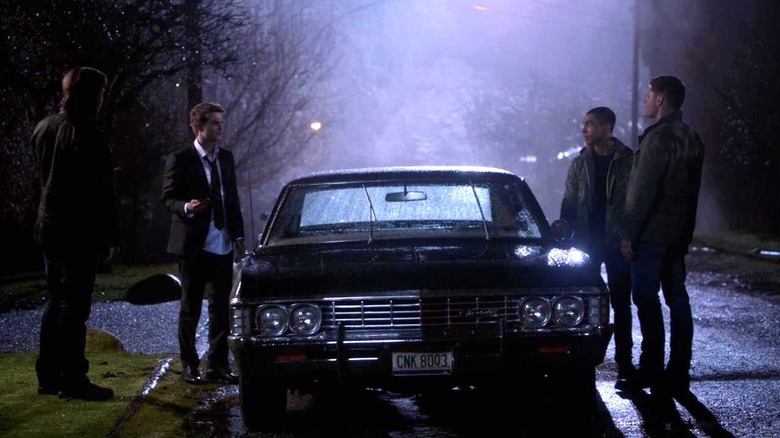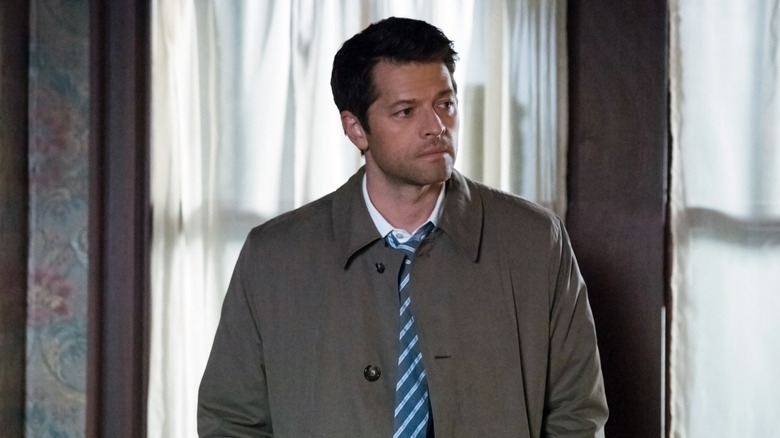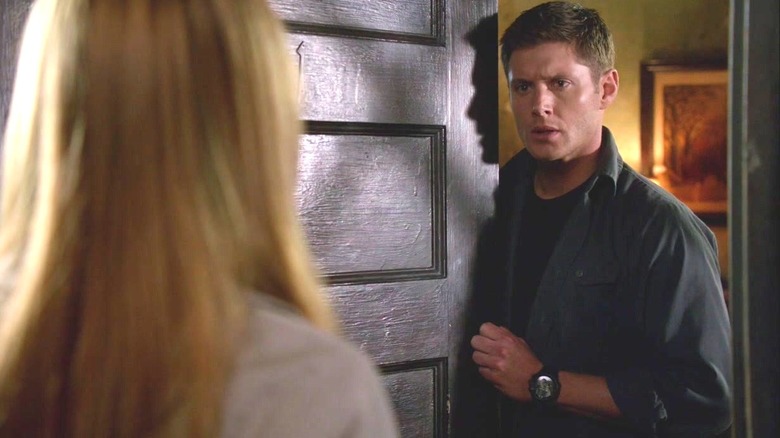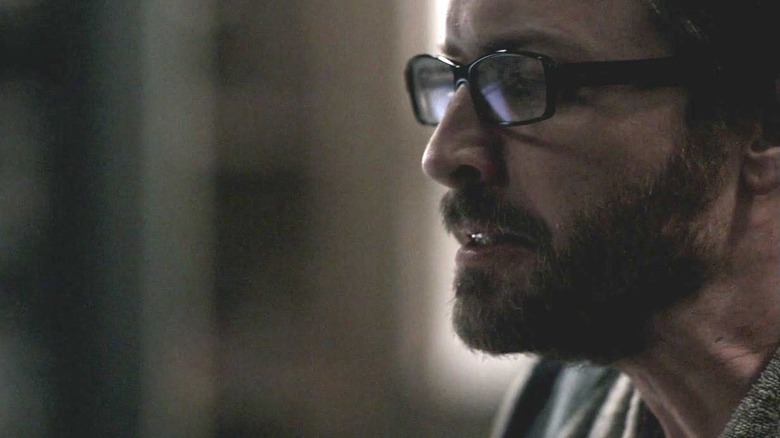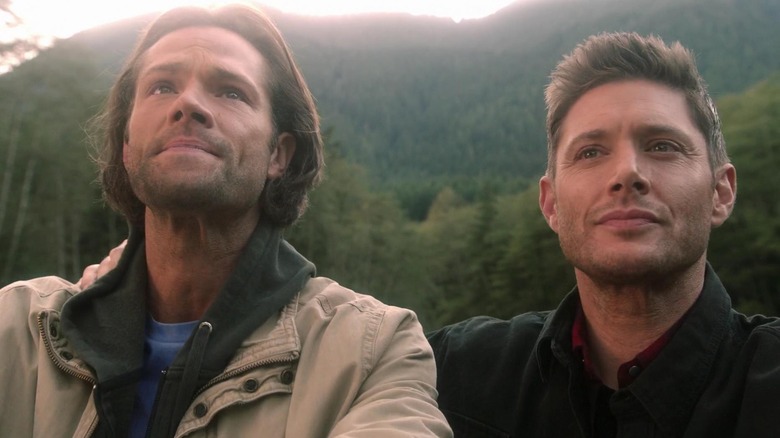Things You Only Notice About Supernatural After Watching It More Than Once
"Supernatural" is currently the longest-running sci-fi/fantasy series of all time — no small feat, as the show claimed the title from "Smallville" after surpassing 218 episodes. With 15 seasons and 327 episodes under its belt, the CW series ran from 2005 — when it first premiered on The WB — all the way to the fall of 2020. After all those years, it was hard to see Sam and Dean's story come to an end, but knowing that Jared Padalecki and Jensen Ackles have continued on, be it in "Walker" or "The Boys," gave us some sort of consolation that maybe one day they'll unite again.
But regardless of whether the Winchesters return anytime soon, there are 15 years worth of stories out there, and if you're anything like us, you've already binged "Supernatural" through more than once. Be it the original five seasons ("The Kripke Era") or the final four ("The Dabb/Singer Era"), there's always something to love about the Winchesters' adventures that makes us crave more. But if you're like us, you also know there are plenty of things that casual viewers might've missed over the years. Things that only multiple binges can shed some light on...
More characters join the main cast than you remember
The main appeal for "Supernatural" was that it was a story about two brothers, Sam and Dean, traveling across the country to hunt monsters. That premise doesn't leave much room for anyone else, but as early as Season 3, Katie Cassidy and Lauren Cohan were added to the roster as the demon Ruby and Bela Talbot, respectively. Fans didn't react well to the boys' new love interests, and they were quickly cut from the show. Misha Collins, who played the lovable angel Castiel, would guest star the following season and soon be promoted to the main cast. His tenure on the series was somewhat rocky, but by the end he was a clear and permanent fixture. But even with the angel by their side, the show always fell back on Sam and Dean.
It wouldn't be until Season 10 that Mark A. Shepherd would join the main cast (though he'd been around since Season 5), giving "King of Hell" Crowley lots more to do until his death at the end of Season 12. From there, Mark Pellegrino joined as the archangel Lucifer and his vessel Nick, with Alexander Calvert starring as his Nephilim spawn Jack. Pellegrino already had a handful of appearances on the show starting with Season 5, but after the Devil and Nick were finally killed off he was only resurrected once more. Calvert's Jack, on the other hand, would stand by Sam and Dean until the show's ultimate end.
The boys' parents come back from the dead, a lot
"Supernatural" was full of resurrections. Sam and Dean both died on multiple occasions, only to come back just about every time. Even when a character kicked the bucket, there was no reason to think that we couldn't see them, or some version of them, again before the series' close. John and Mary Winchester were no exceptions: Actors Jeffrey Dean Morgan and Samantha Smith became permanent staples of "Supernatural," even if their characters weren't alive for all of it. While Mary's death in the pilot episode of "Supernatural" was the catalyst for the whole series, the Winchesters didn't even go a full season before encountering their mother. Her ghost haunted their old house as early as Season 1's "Home." After John died in the Season 2 premiere, it only took until the season finale for his ghost to appear and save his sons.
Mary would eventually be resurrected at the end of Season 11, and would hunt with her boys for a few years before her untimely death at Jack's hand. Of course, Mary wasn't alone. John would briefly be resurrected in the 300th episode, "Lebanon," to enjoy a real family dinner with his wife and sons. Sam and Dean would get to meet the younger versions of both their parents (played by Matt Cohen and Amy Gumenick) via time travel once or twice too, though John and Mary had their memories of their meeting wiped. Guess you really can't keep a Winchester down.
A monstrous game of tell, don't show
One of the most appealing things about "Supernatural" is the vast catalog of creatures, monsters, and spiritual beings that the Winchesters are pitted against week after week. From vampires and werewolves to ghosts and demons, we've seen just about every kind of hunting combination we could ask for. But there are a few monsters who are mentioned quite a bit that we only ever got to see in action once or twice. The most elite monsters, dragons, showed up in Season 6's "Like A Virgin" only to seemingly disappear forever. Sirens suffered a similar fate, and ghouls only showed up three times total despite the brothers' frequent trips to various graveyards. The real missed opportunity, though? Black dogs, which were referenced often in the first few seasons but, save for a "Supernatural" comic series, never showed up.
Then there were some of the more interestingly American monsters, such as wendigos and skinwalkers. In the second episode of the series, the brothers take down a wendigo in Colorado, never to hunt one again (despite countless mentions over the years). Similarly, the boys only encountered one skinwalker, in Season 6. With such a vast history of cryptid creatures in the continental United States (we're looking at you, Mothman), you'd think the brothers would find something a bit more interesting to hunt than yet another vampire or demon.
From 'evil Sam' to 'evil Dean'
One of the most recurring tropes the brothers dealt with in the first six seasons or so was the constant fear that Sam would eventually go "dark side." This first became a challenge in Season 2 when their father told Dean that he might have to kill Sam one day, so when he got possessed in "Born Under a Bad Sign" it seemed like it was finally happening. Azazel teased something similar after Sam returned from the dead, but it wouldn't be until Season 4 that Sam began drinking demon blood to use his "Special Child" powers. This eventually culminated in him becoming Lucifer's vessel, and later the angel Gadreel's. Sam would go "evil" again after his time in Hell when he lost his soul, which might've been the scariest bit.
After beating up Sam for so long, the writers eventually turned their "evil" plots toward Dean, who took on the Mark of Cain in Season 9, which turned him into a serial killer. His death at the end of the season would result in Dean becoming a demon ("Deanmon") and then trying to kill Sam. At the end of Season 13, Dean became the vessel for the Apocalypse World version of the archangel Michael, who decided he wanted to wipe out humanity via grace-enhanced monsters. This isn't even to mention the dark visions Sam has in Season 15.
The show's shift from film to digital
Before the advent of digital filming, television had a very distinct look and feel that doesn't really exist anymore. The grain of film and/or softer videotape look have been replaced with a cleaner aesthetic, with less location shooting and more controlled studio work that gives the crew added control over how a shot looks. "Supernatural" fell prey to digital as well — after the show's third season, the crew shifted from shooting on 35mm to digital. The progress of digital camera technology, and even lighting (LEDs were huge), contributed to the series' signature feel, especially in the back half of the series.
Many fans have criticized the show's decision to move from film to digital, as the grainy feel of 35mm often helped accent the horror elements that initially made this series thrive. As the show progressed, the horror was toned down for more fantasy-related plotlines, so the lighting setups changed drastically. "Supernatural" might not have remained "dark and gritty," but we don't love it any less.
Lowering the volume on the 'Supernatural' soundtrack
One of the early staples of "Supernatural" was the show's frequent use of classic rock. Artists and bands like AC/DC, Bob Seger, Styx, Boston, Blue Oyster Cult, Metallica, the Allman Brothers Band, Def Leppard, and many others became the official soundtrack for "saving people and hunting things." Each season premiere and finale opens with an explosive classic rock track — often "Carry On Wayward Son" by Kansas — that sets the tone, preparing you for whatever Sam and Dean have to face next.
But at some point the show's music budget must've gotten slashed, since the classic rock tunes which set the backdrop for every episode of the early seasons were heard less frequently the longer the show ran. It's a shame, because those songs made some of the monsters even scarier — such as "(Don't Fear) The Reaper" which plays as a Reaper takes its next victim — and were used to cement the relationship between the brothers, like the "Wanted Dead or Alive" sequence at the end of Season 3. Even though Dean's favorite tunes were played less as "Supernatural" went on, there's no doubt they had an impact on the series and its incredible fanbase.
The Winchesters are super inconsistent
Throughout "Supernatural," there are quite a few monsters that Sam and Dean don't kill. There are a lot of reasons for this — many of them actively don't kill human beings or, in the case of vampires, don't drink human blood. One example is Lenore, a vampire who only drinks from cattle. The boys let her go because she's innocent, and as the series goes on they're careful not to kill other non-threatening monsters — that is, until Dean kills Sam's friend Amy, a kitsune, after she kills bad guys to save her sick son in "The Girl Next Door." Dean's prejudice against monsters would change during his time in Purgatory, where he befriends the vampire Benny. Still, Sam gets harder on monsters as time goes on, and doesn't stop Bobby from nearly killing an innocent vampire in "Gods and Monsters."
This inconsistency applies to demons too — while they're are "evil spirits" by definition, their vessels are often innocent victims. Yet Sam, Dean, Cass, and the rest slice their way through countless demon-possessed innocents over the years. In Season 11, Sam tries to get back to the "saving part" of the Winchester mission statement and does his best to balance killing demons with saving their victims. This doesn't last long, though, as the brothers go right back to using Ruby's knife on all their black-eyed adversaries and an angel blade on the angels' vessels too.
Lots of stories are dropped completely
With so many episodes, it's no wonder that "Supernatural" would drop a few plots as the show went on. While the main mythology arc is definitely settled by the end, there are a bunch of loose ends that the series didn't spend enough time tying up. Be it romantic interests, dropped quests, or the run-amok Antichrist himself, "Supernatural" didn't always wrap everything up with a neat bow. One of the biggest dropped plotlines comes from the Season 9 episode "Bloodlines," which was a backdoor pilot for a canceled spinoff titled "Supernatural: Bloodlines." The network may have decided not to pursue the spinoff, but Sam and Dean's discovery of a monster mafia conspiracy that runs the city of Chicago definitely warranted a follow-up of some kind.
Thankfully, the next time an attempt at a "Supernatural" spinoff failed, the arc that was supposed to set it up — titled "Wayward Sisters" — continued into the next two seasons. That said, characters like Claire Novak, Cole Trenton, Krissy Chambers, the Ghostfacers, Aaron Bass, Ben and Lisa Braeden, and even Cassie Robinson (Dean's original "true love") were all written out of the show with little to no explanation. They aren't the only ones, but they represent a common problem that "Supernatural" had with introducing seemingly recurring characters only to forget about them entirely as time went on.
Castiel doesn't have much to do after Season 8
It's no secret that our favorite angel is one of the most popular characters on "Supernatural." When Misha Collins originally signed on for the series, he wasn't supposed to make it past a few episodes in the fourth season, but it quickly became clear that both Castiel and Collins were loved by both the cast and crew as well as the fanbase. Cass went through a lot in his first few seasons, from being an "Angel of the Lord" to his rebellion from Heaven, but the angel always stood by Sam and Dean (particularly Dean) even in the literal face of Death. Castiel ended up leading a faction of Heaven, trying to become the "new God," and eventually made it his mission to protect the Angel Tablet. He always made himself busy.
But after the angels fell, Castiel's angelic powers (and grace) became incredibly inconsistent, his allies came and went, and his story was more or less at a standstill for the back half of the series. While there was a brief moment in Season 12 when Cass took it upon himself to protect the mother of Lucifer's child, he was otherwise mostly in a dramatic lull after Season 9. Only in his final moments does Castiel make a choice that's actually compelling.
Dean has fathered multiple children
It's no secret that Dean has a bit of an intimacy problem, and by problem we mean that he can't hardly work a case without it. Be it the waitresses in each local dive or the victims of terrible crimes that he works to solve, Dean can't ever get enough. His dreams are even filled with it, and if that doesn't make him something of a satyriasis, then what on earth could? That said, Dean has fathered a few children throughout the show's run, most notably his half-Amazonian daughter Emma. While Emma only showed up in Season 7's "The Slice Girls" and immediately attempted patricide, the revelation that Dean had a child of his own didn't really affect his outlook on life in the slightest, even when Sam killed his baby girl.
There's also Ben Braeden, who Dean meets for the first time in Season 3 and helps raise in the year between Seasons 5 and 6. While Ben's mother Lisa claims he isn't Dean's, we're not so sure. Sure, a demon once told Dean that Ben was his son, but demons often lie. Still, Ben not only looks like his surrogate father, but acts like him too, as if it's in his genes. There's no doubt in plenty of fans' minds that Ben is actually Dean's son, which makes it all the harder when Dean wipes his memory and leaves.
Chuck's story doesn't quite make sense
When Chuck Shurley shows up in Season 4, it's revealed that he's the author behind the "Supernatural" book series that chronicled the brothers' most famous adventures under the alias Carver Edlund, but soon after we learn that Chuck is actually a "prophet of the Lord." His role as a prophet made sense — he had visions of the future, he wrote down what he saw, and it felt very biblical in a way. Not only that, but Chuck didn't seem to develop any sense of omniscience; he was clearly a nervous writer worried about fan expectations. After "Swan Song," he disappeared in what seemed like a reference to the biblical prophets Enoch or Elijah rather than a revelation of his divinity.
In Seasons 10 and 11, Chuck returns and reveals himself to have been "God" the whole time. This retcon in the story seemed like a nice way to wrap up that season's "Darkness" arc, and it worked (mostly), but when Chuck returns at the end of Season 14 as the final "big bad," it doesn't quite add up. Be it Chuck's inconsistent omniscience (thinking Gabriel was dead when we really wasn't), killing his most devoted followers, or even sending Kevin Tran to Hell instead of Heaven, Chuck's motives are never clear. Instead, the whole thing just feels like a lazy retcon to make God the bad guy.
They didn't quite know how they wanted the road to end
After the series' penultimate episode "Inherit the Earth" aired, it was really unclear what "Supernatural" could do next. After wrapping up the series' entire arc, Sam and Dean were finally left to live more peaceful and free lives of their own choosing. So when series finale "Carry On" aired, let's just say that fans were pretty mixed about the whole thing. Co-lead Jensen Ackles has voiced his displeasure over the finale a few times, but "Carry On" is what we got, and it's certainly something, even if the series didn't prepare us for it at all.
On one hand, it makes sense that Dean would go out hunting. Sure, we always thought he'd be an older, more surly hunter like Bobby, but that final scene between him and Sam makes it all work. As for Sam, he eventually quits hunting, settles down, and has a family, which admittedly feels a bit strange given that he finally came to terms with his life in the family business. Overall, after series creator Eric Kripke's departure following Season 5, the show felt like it never really knew how the story was supposed to end. Kripke's original story concluded with "Swan Song," which many fans still consider the perfect ending. But regardless, "Supernatural" is great because at the end of the day, it "never really ends" — and there's always room for more.
